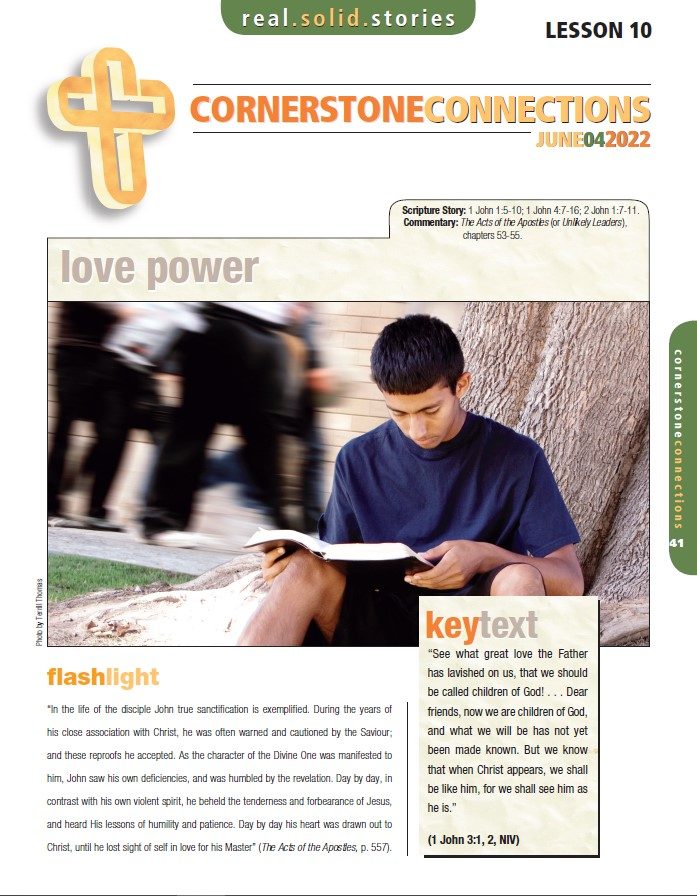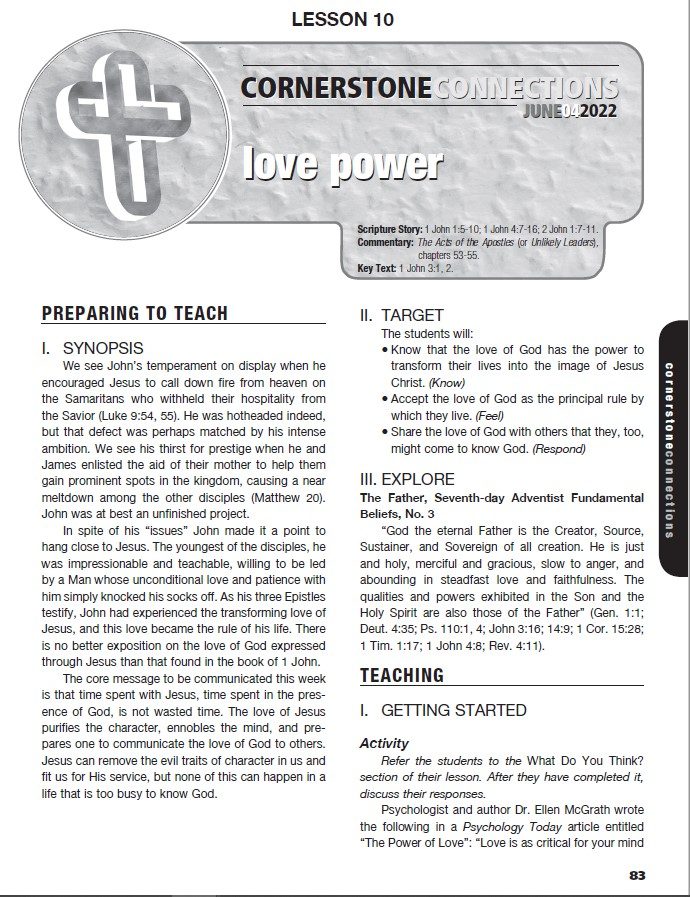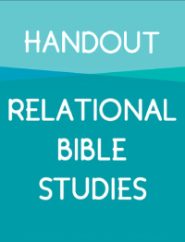“Love Power”
Click below to download the Cornerstone Connections leader’s guide and student lesson. This week’s resources also include two lesson plans and a discussion starter video which offer different ways of looking at the topic. Each lesson plan includes opening activities, scripture passages, discussion questions, and real-life applications.
1 John 1:5-10
1 John 4:7-16
2 John 1:7-11
Time spent with Jesus is never wasted time. Lingering in Christ’s presence and embracing His love gives the power to transform our lives. How are others transformed in your presence?
SCRIPTURE PASSAGES
OVERVIEW
It’s an age-old question. It’s been asked over and over. In 1984, Tina Turner entreated the listening public by asked the question in music:
“What's love got to do, got to do with it?
What's love but a second-hand emotion?
Oh-oh, what's love got to do, got to do with it?
Who needs a heart when a heart can be broken?”
Her question is legitimate. In the context of the Great Controversy—what is love? What does love have to do with why we were created? What does love have to do with why Jesus went to the cross? What does love have to do with Jesus’ second coming? Here’s a secret—though it’s not really a secret—without love we wouldn’t be here. God created us to love us and because of that love He wasn’t willing to live without us. God’s love is everything.

OPENING ACTIVITY: WHAT IS LOVE?
Instructions:
QUESTIONS
TRANSITION
Who defines what love is—culture, tradition, emotions, literature, or economics? It seems like an easy question, but it is a complex one that has plagued humanity for millennia. Today’s lesson will help narrow the question and help provide an answer to the question.

BIBLE STUDY GUIDE
Read John 1:5-10.
5 The light shines in the darkness, and the darkness has not overcome it.
6 There was a man sent from God whose name was John. 7 He came as a witness to testify concerning that light, so that through him all might believe. 8 He himself was not the light; he came only as a witness to the light.
9 The true light that gives light to everyone was coming into the world. 10 He was in the world, and though the world was made through him, the world did not recognize him.
QUESTIONS
Read 1 John 4:7-16.
7 Dear friends, let us love one another, for love comes from God. Everyone who loves has been born of God and knows God. 8 Whoever does not love does not know God, because God is love. 9 This is how God showed his love among us: He sent his one and only Son into the world that we might live through him. 10 This is love: not that we loved God, but that he loved us and sent his Son as an atoning sacrifice for our sins. 11 Dear friends, since God so loved us, we also ought to love one another. 12 No one has ever seen God; but if we love one another, God lives in us and his love is made complete in us.
13 This is how we know that we live in him and he in us: He has given us of his Spirit. 14 And we have seen and testify that the Father has sent his Son to be the Savior of the world. 15 If anyone acknowledges that Jesus is the Son of God, God lives in them and they in God. 16 And so we know and rely on the love God has for us.
God is love. Whoever lives in love lives in God, and God in them.
QUESTIONS

APPLICATION
Here’s a great seven-minute video resource that puts our whole lesson together.
https://digma.com/fredericks-experiment/
We are not victims of chance. We are not on this earth by accident! We exist because of a God who loves us so much that He wasn’t willing to live without us and risked everything because of this love.
FOLLOW UP
Each day during this coming week, write/text/Snapchat/Instagram/IM someone to let them know how much they mean to you and how much they mean to God.

SCRIPTURE PASSAGE
LEADER’S NOTE
For a Relational Bible Study (RBS) you’ll want to get into the Scripture passage and encourage the youth to imagine participating in the story while it’s happening. Then you will be able to better apply it to your own situation today.
You will need to ask God for the Holy Spirit to be present as your small group discusses the questions (no more than 3-6 people in a group is recommended). Start with the opening question. It is a personal question and the answer is unique for each individual. There is no right answer and nobody is an expert here, so don’t be surprised when you hear different responses. You are depending on the Holy Spirit to be present and to speak through your group. Say what God prompts you to say, and listen to what others share.
Take turns reading the chapter out loud. Follow that with giving the students some time to individually mark their responses to the questions (a PDF version of the handout is available as a download). This gives each person a starting point for responding when you start to share as a group. Next, begin the discussion by asking the students to share what they marked and why on each question as you work your way through. Feel free to take more time on some questions than others as discussion warrants.
Encourage each person in the group to apply what is discussed to their personal lives and to share with the group what they believe God wants them to do. Then ask them to pray that God will help each of them to follow through in doing so. Remind them to expect that God will show them ways to live out the message of this passage in the coming week, and that they are free to ask others in the group to help hold them accountable.
OVERVIEW
This week’s lesson might need very little introduction. It’s about the heart of God, the theme of Scripture, and the actions and attitudes God desires for us to receive and to give. The topic is love!
Many young people, especially after hormones kick in at the start of adolescence, associate romance and sexuality with the word love. That’s part of it, but certainly not the whole story! You could spend time on Greek words for “love” that broaden it to include the four found in the Bible and four other Greek words not found in Scripture. Let’s start with the four in Scripture:
Eros—sexual passion
Storge—love of parents for their children
Philio—deep friendship
Agape—selfless care for someone else
Here are four additional Greek words for love, but these aren’t found in Scripture:
Ludus—playful flirting
Philautia—loving one’s self in healthy ways
Xenia—generosity such as hospitality
Pragma—long-term relationships forged over decades
While you might get side-tracked talking about this great variety of Greek words for love, be sure you reserve enough time for the Relational Bible Study Scripture passage in two chapters from the book of 1 John—specifically chapters three and four. This will primarily be about agape love—God’s love for us and the love He commands us to give to others, regardless of what the feelings might be (or not be). It’s based on principle and demonstrates itself in action rather than being controlled by feelings.
And protect time in Sabbath School to make personal applications. This is what it’s all about!
Pray for God to reveal true love to you and your group during this Sabbath’s RBS, and then put it into action in the coming week.
True Love
What’s a love song you’ve liked at some point in your life?
Read 1 John 3:1-4:21.
3 See what great love the Father has lavished on us, that we should be called children of God! And that is what we are! The reason the world does not know us is that it did not know him.
2 Dear friends, now we are children of God, and what we will be has not yet been made known. But we know that when Christ appears, we shall be like him, for we shall see him as he is. 3 All who have this hope in him purify themselves, just as he is pure.
4 Everyone who sins breaks the law; in fact, sin is lawlessness. 5 But you know that he appeared so that he might take away our sins. And in him is no sin. 6 No one who lives in him keeps on sinning. No one who continues to sin has either seen him or known him.
7 Dear children, do not let anyone lead you astray. The one who does what is right is righteous, just as he is righteous. 8 The one who does what is sinful is of the devil, because the devil has been sinning from the beginning. The reason the Son of God appeared was to destroy the devil’s work. 9 No one who is born of God will continue to sin, because God’s seed remains in them; they cannot go on sinning, because they have been born of God. 10 This is how we know who the children of God are and who the children of the devil are: Anyone who does not do what is right is not God’s child, nor is anyone who does not love their brother and sister.
More on Love and Hatred
11 For this is the message you heard from the beginning: We should love one another. 12 Do not be like Cain, who belonged to the evil one and murdered his brother. And why did he murder him? Because his own actions were evil and his brother’s were righteous. 13 Do not be surprised, my brothers and sisters, if the world hates you. 14 We know that we have passed from death to life, because we love each other. Anyone who does not love remains in death. 15 Anyone who hates a brother or sister is a murderer, and you know that no murderer has eternal life residing in him.
16 This is how we know what love is: Jesus Christ laid down his life for us. And we ought to lay down our lives for our brothers and sisters. 17 If anyone has material possessions and sees a brother or sister in need but has no pity on them, how can the love of God be in that person? 18 Dear children, let us not love with words or speech but with actions and in truth.
19 This is how we know that we belong to the truth and how we set our hearts at rest in his presence: 20 If our hearts condemn us, we know that God is greater than our hearts, and he knows everything. 21 Dear friends, if our hearts do not condemn us, we have confidence before God 22 and receive from him anything we ask, because we keep his commands and do what pleases him. 23 And this is his command: to believe in the name of his Son, Jesus Christ, and to love one another as he commanded us. 24 The one who keeps God’s commands lives in him, and he in them. And this is how we know that he lives in us: We know it by the Spirit he gave us.
On Denying the Incarnation
4 Dear friends, do not believe every spirit, but test the spirits to see whether they are from God, because many false prophets have gone out into the world. 2 This is how you can recognize the Spirit of God: Every spirit that acknowledges that Jesus Christ has come in the flesh is from God, 3 but every spirit that does not acknowledge Jesus is not from God. This is the spirit of the antichrist, which you have heard is coming and even now is already in the world.
4 You, dear children, are from God and have overcome them, because the one who is in you is greater than the one who is in the world. 5 They are from the world and therefore speak from the viewpoint of the world, and the world listens to them. 6 We are from God, and whoever knows God listens to us; but whoever is not from God does not listen to us. This is how we recognize the Spirit of truth and the spirit of falsehood.
God’s Love and Ours
7 Dear friends, let us love one another, for love comes from God. Everyone who loves has been born of God and knows God. 8 Whoever does not love does not know God, because God is love. 9 This is how God showed his love among us: He sent his one and only Son into the world that we might live through him. 10 This is love: not that we loved God, but that he loved us and sent his Son as an atoning sacrifice for our sins. 11 Dear friends, since God so loved us, we also ought to love one another. 12 No one has ever seen God; but if we love one another, God lives in us and his love is made complete in us.
13 This is how we know that we live in him and he in us: He has given us of his Spirit. 14 And we have seen and testify that the Father has sent his Son to be the Savior of the world. 15 If anyone acknowledges that Jesus is the Son of God, God lives in them and they in God. 16 And so we know and rely on the love God has for us.
God is love. Whoever lives in love lives in God, and God in them. 17 This is how love is made complete among us so that we will have confidence on the day of judgment: In this world we are like Jesus. 18 There is no fear in love. But perfect love drives out fear, because fear has to do with punishment. The one who fears is not made perfect in love.
19 We love because he first loved us. 20 Whoever claims to love God yet hates a brother or sister is a liar. For whoever does not love their brother and sister, whom they have seen, cannot love God, whom they have not seen. 21 And he has given us this command: Anyone who loves God must also love their brother and sister.
1. When do you sense God’s love being lavished on you?
2. How do you know you are a child of God?
5. What does it take to “love one another”?
4. “God is love” (vs. 8, 16). How do you know?
5. Why does John give so much emphasis to loving others?
6. What counsel or advice do you have for people who lack love?
7. Why do you love God? What would make that love increase?
8. How can/does God’s love for you change the way you relate to others?
SUMMARY
This could seem like a fairytale or just good ideas or encouraging words. But if you take it into your mind and heart and let it move into action, it can guide your attitude and actions. This has to do with how you relate to God, to yourself, and to others—that’s pretty much everyone! You will need to keep returning to God as the supply for agape love, and then put it into action for it to be real. This is true love.

APPLICATION
Love, especially agape love, needs to move into action. Here are just a few ideas to get you thinking and then “doing” love. Try these or come up with your own applications.
With so many competing voices telling you’re loved when you might not believe it or maybe feel someone is just trying to manipulate you, and with other voices telling you that you aren’t loved or not worth being loved, it’s sometimes hard to believe you are truly loved.
Here's a link for it on YouTube: https://www.youtube.com/watch?v=TCunuL58odQ
Or Spotify: https://open.spotify.com/track/6WSFMa721PvfnspCRsGOMh?autoplay=true





